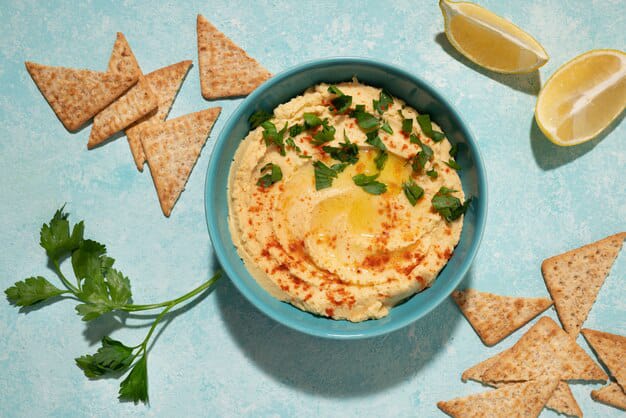Hummus is a beloved Middle Eastern dip that has become a global favorite. Made from a blend of chickpeas, tahini, olive oil, lemon juice, and garlic, it’s known for its creamy texture and savory flavor. But if you’re gluten-sensitive or have celiac disease, you might wonder: does hummus contain gluten?
Gluten is a protein found in grains like wheat, barley, and rye. For people with gluten-related disorders, even small amounts can cause health issues. In this article, we’ll explore whether hummus is gluten-free and how to enjoy it safely.
Is Hummus Gluten-Free?
The traditional ingredients in hummus—chickpeas, tahini (made from sesame seeds), olive oil, lemon juice, and garlic—are naturally gluten-free. None of these components come from wheat, barley, or rye. This makes plain, homemade hummus an excellent option for people avoiding gluten.
However, the story doesn’t end there. While traditional hummus is naturally gluten-free, there are some concerns to consider with store-bought or processed varieties.
Potential Sources of Gluten Contamination
Some hummus products may become contaminated with gluten during manufacturing. This can happen if factories process other gluten-containing foods alongside hummus. Cross-contamination is a significant concern for those with celiac disease or severe gluten sensitivity.
Additionally, flavored or processed hummus varieties sometimes include ingredients that may contain gluten. For example, certain spice blends, preservatives, or additives can be problematic. Always check the ingredient list and packaging for potential red flags like wheat-based thickeners or malt vinegar.
Related to Read: Does Hummus Have Carbs? A Detailed Nutritional Insight
Ensuring Your Hummus Is Gluten-Free

Reading Labels and Certifications
When buying hummus from the store, look for labels that specify “gluten-free.” Certified gluten-free products undergo rigorous testing to ensure no traces of gluten are present. Reading the ingredient list is essential. Avoid products with vague terms like “natural flavors,” as these might include gluten.
Making Homemade Gluten-Free Hummus
The safest way to enjoy hummus is by making it at home. A simple recipe includes the following ingredients:
- 2 cups cooked chickpeas (or canned, rinsed, and drained)
- 3 tablespoons tahini
- 2 tablespoons olive oil
- Juice of 1 lemon
- 2 cloves garlic
- Salt to taste
Blend these ingredients in a food processor until smooth. To avoid cross-contamination, ensure your utensils and kitchen surfaces are free from gluten residues.
Gluten-Free Alternatives and Pairings
Hummus is best enjoyed with dippers, but traditional pita bread is off-limits for those avoiding gluten. Here are some excellent gluten-free alternatives:
- Vegetables: Carrot sticks, cucumber slices, celery, and bell pepper strips.
- Rice Cakes: Light and crispy, they pair well with hummus.
- Gluten-Free Crackers: Many brands offer crackers made from almond flour, rice flour, or other gluten-free grains.
Exploring Other Gluten-Free Spreads
If you’re seeking variety, there are other gluten-free spreads to try:
- Baba Ganoush: Made from roasted eggplants, it offers a smoky flavor similar to hummus.
- Guacamole: This creamy avocado dip is naturally gluten-free and rich in healthy fats.
- Tzatziki: A yogurt-based dip flavored with cucumber, garlic, and dill. Just ensure the yogurt used is gluten-free.
Related to Read: Is Hummus High in Protein? A Comprehensive Guide
Frequently Asked Questions
Can People with Celiac Disease Eat Hummus?
Yes, people with celiac disease can safely enjoy traditional hummus made from gluten-free ingredients. However, they should be cautious with store-bought varieties and always read labels to ensure no cross-contamination or gluten-containing additives.
What Are Common Gluten-Free Snacks?
For those on a gluten-free diet, here are some popular snack options:
- Fresh fruits like apples, bananas, and berries.
- Nuts and seeds (check for gluten-free labeling to avoid cross-contamination).
- Gluten-free granola bars.
- Plain popcorn.
- Yogurt with gluten-free toppings.
Conclusion
Hummus, in its traditional form, is naturally gluten-free and a nutritious choice for many diets. However, individuals with gluten sensitivities or celiac disease should exercise caution with processed varieties due to the risk of cross-contamination or hidden gluten.
Making it at home is the best way to ensure it’s entirely gluten-free. Pair it with gluten-free dippers or explore other spreads like baba ganoush or guacamole for added variety. With a little care, you can safely enjoy this delicious dip as part of your gluten-free lifestyle.

